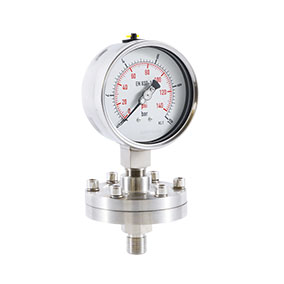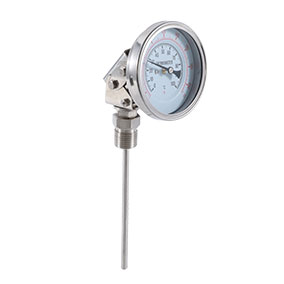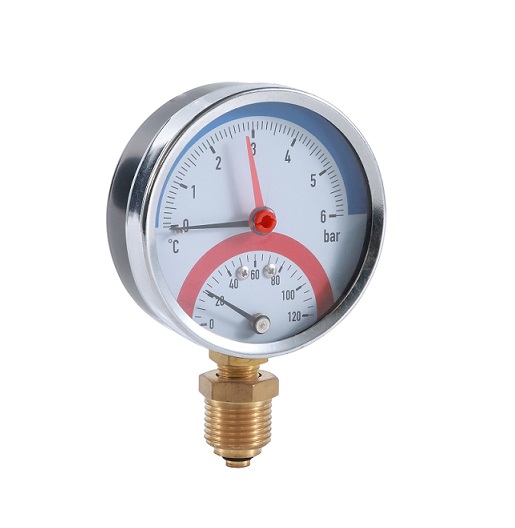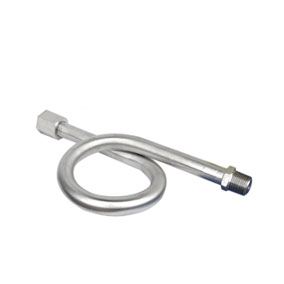What are the types of pressure gauges used in industry?
In modern industry, pressure measurement is a crucial step in ensuring the normal operation of equipment and guaranteeing production safety. Pressure gauges, as measuring tools, are widely used in various industries such as petrochemicals, power, food, and pharmaceuticals. Choosing the appropriate type of pressure gauge can not only improve production efficiency but also prevent equipment failures and safety accidents. This article will introduce several common types of industrial pressure gauges and their characteristics to help understand their applicability and selection criteria in different application scenarios.
1. Common Types of Pressure Gauges
Mechanical pressure gauges are the most traditional pressure measuring tools, typically sensing pressure using the principles of a Bourdon tube (bellows) or a cylindrical tube. Their working principle is simple, robust, and durable, making them widely used in low- and medium-pressure environments. The advantages of mechanical pressure gauges are low cost, simple structure, and the ability to operate without a power source, making them suitable for most traditional industrial applications, such as gas pipelines and liquid storage tanks.
Electronic pressure gauges, on the other hand, use changes in voltage, current, or frequency to display pressure data. They offer high accuracy, rapid response, and usually have digital display functionality for easy reading. These gauges are suitable for high-precision, high-frequency industrial applications and are commonly used in automated control systems, precision equipment, and scientific research.
Differential pressure gauges are used to measure the pressure difference between two locations and are widely used in filters, air flow meters, and refrigeration equipment. They can monitor changes in pressure difference in real time, helping to determine the operating status of equipment and prevent overload or malfunction.
Vacuum pressure gauges are specifically designed to measure pressure in vacuum environments below atmospheric pressure, such as vacuum pumps, gas separation equipment, and semiconductor manufacturing processes. Their design takes into account the special characteristics of the vacuum environment and typically uses corrosion-resistant materials to ensure stable operation over long periods.
2. Selection Criteria for Different Types of Pressure Gauges
Choosing the right pressure gauge requires considering not only the specific conditions of the working environment but also measurement accuracy, durability, and maintenance costs. First, the working environment is one of the key factors in selecting a pressure gauge. For example, in high-temperature or highly corrosive media environments, electronic pressure gauges are more suitable due to their higher accuracy and faster response; while in low-temperature, high-humidity, or oily/gas environments, mechanical pressure gauges are more advantageous due to their robustness, durability, and lack of power supply requirements.
Second, accuracy requirements are also crucial in selecting the type of pressure gauge. In some precision manufacturing or scientific research fields, where extremely high-precision pressure measurement is required, electronic pressure gauges are undoubtedly the best choice. However, for most conventional industrial applications, such as water pump systems and pipeline pressure monitoring, mechanical pressure gauges and differential pressure gauges are sufficient.
Finally, cost and maintenance are also factors to consider when choosing a pressure gauge. Electronic pressure gauges are relatively expensive and require regular calibration and maintenance, while mechanical pressure gauges are less expensive and easier to maintain. If the equipment requirements are basic and the maintenance environment is relatively harsh, mechanical pressure gauges are a more economical choice.
3. Typical Applications of Pressure Gauges in Industry
Chemical Industry: In chemical plants, equipment such as reactors, storage tanks, and pipelines often require real-time pressure monitoring to prevent explosions or leaks. Mechanical pressure gauges are commonly used in low- to medium-pressure environments, providing intuitive pressure data. For reaction processes requiring high-precision control, electronic pressure gauges can monitor and adjust pressure more accurately.
Food and Pharmaceutical Industry: In these industries, precise pressure control is crucial to ensuring production quality. Electronic pressure gauges, due to their high accuracy and stability, are frequently used in strictly hygienic environments, such as during sterilization and steam sterilization processes, to ensure product quality and production safety.
HVAC (Heating, Ventilation, and Air Conditioning) Systems: Differential pressure gauges are commonly used in HVAC systems to monitor airflow and pressure differences, helping to regulate the operation of the ventilation system. They help the system maintain stable air quality and temperature control, ensuring the efficient operation of the air filtration system.
Energy and Power Industry: In power plants, especially boiler systems, pressure gauges are used to monitor the internal pressure of the boiler, ensuring the safety and stability of boiler operation. Electronic pressure gauges, due to their high accuracy and seamless integration with control systems, have become indispensable equipment in the modern energy industry.
Different types of pressure gauges have their own advantages in industrial applications. Selecting the appropriate pressure gauge based on actual needs can effectively improve production efficiency and ensure equipment safety. When purchasing pressure gauges, factors such as the working environment, accuracy requirements, and economics must be considered comprehensively. Understanding the functions and application scenarios of pressure gauges helps to achieve more efficient and stable production management in the industrial field.




